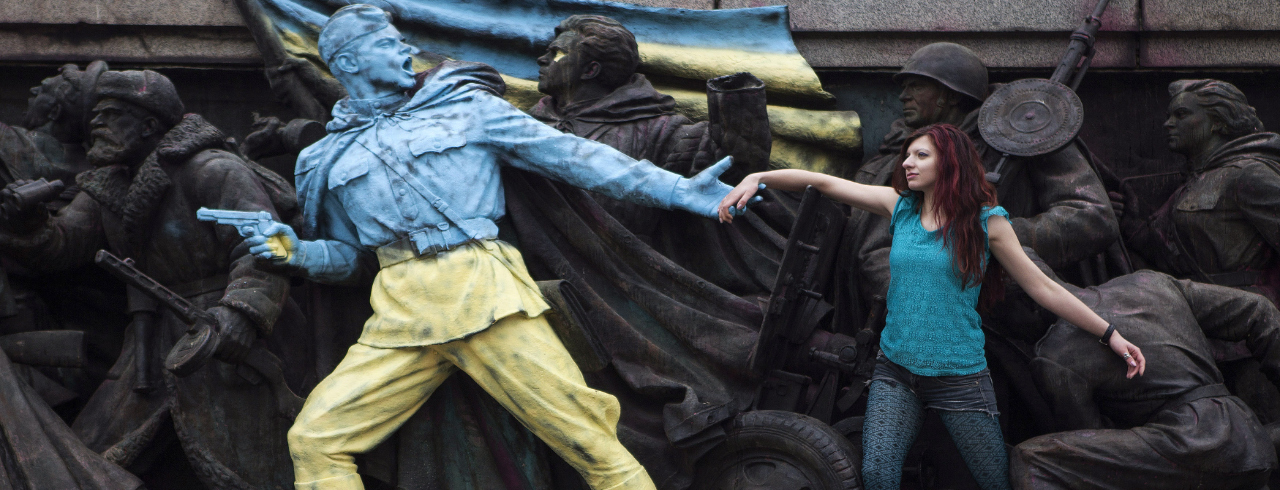THE UTOPIAN
- PUTIN UNLEASHES WAR ON A DEFIANT UKRAINE!
- Defend Ukraine! Revolutionary Opposition to Russian and U.S. Imperialism!
Statement of The Utopian Tendency
PUTIN UNLEASHES WAR ON A DEFIANT UKRAINE!
Written by M. Ermler, 2/28/2022
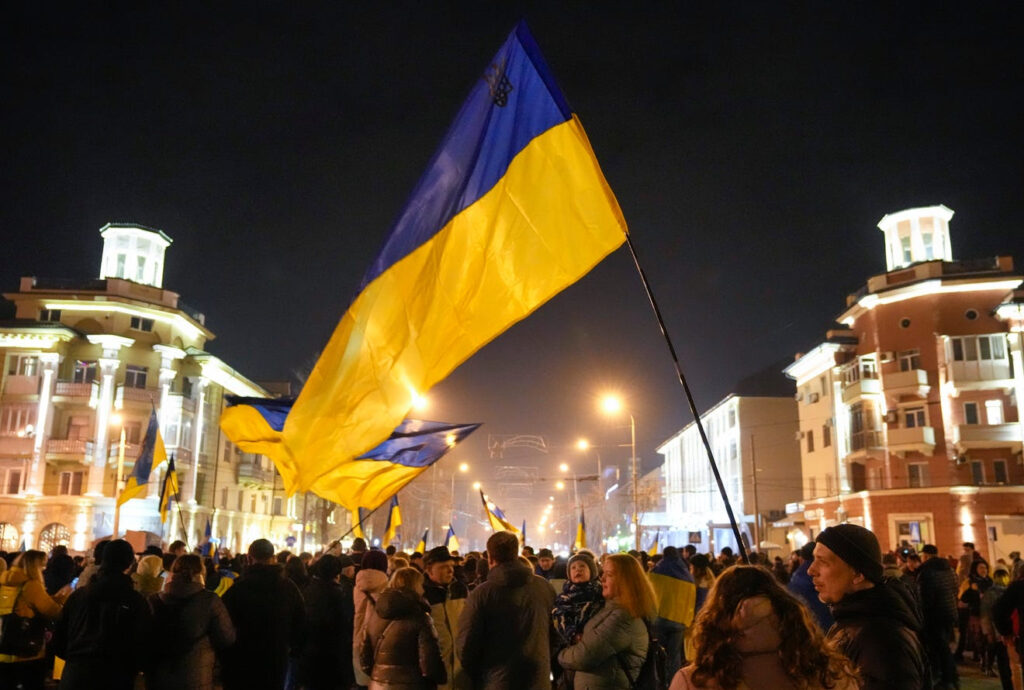
The Utopian Tendency unconditionally supports the Ukrainian people in their heroic struggle to defeat Russian aggression and determine their own future.
Everyone must be clear that the Russian president, Vladimir Putin, bears full responsibility for this war on the Ukrainian people. It is not widely or deeply supported by the people of Russia. It also dangerously flirts with a wider conflagration of international consequences. Putin and his allied ruling strata own this. Hopefully it leads to his and his regime’s downfall and even more.
The Armed Forces of Ukraine have frustrated the Russian attack with the active and armed support of the Ukrainian people. This successful resistance was not a product of enhanced training and material aid alone. It arises from a national army reforged after 2014 in the spirit and experiences of domestic uprising and subsequent defenses of independence. Ukraine’s ongoing popular movements against capitulation and in support of the standing military structures are indispensable to this resistance.
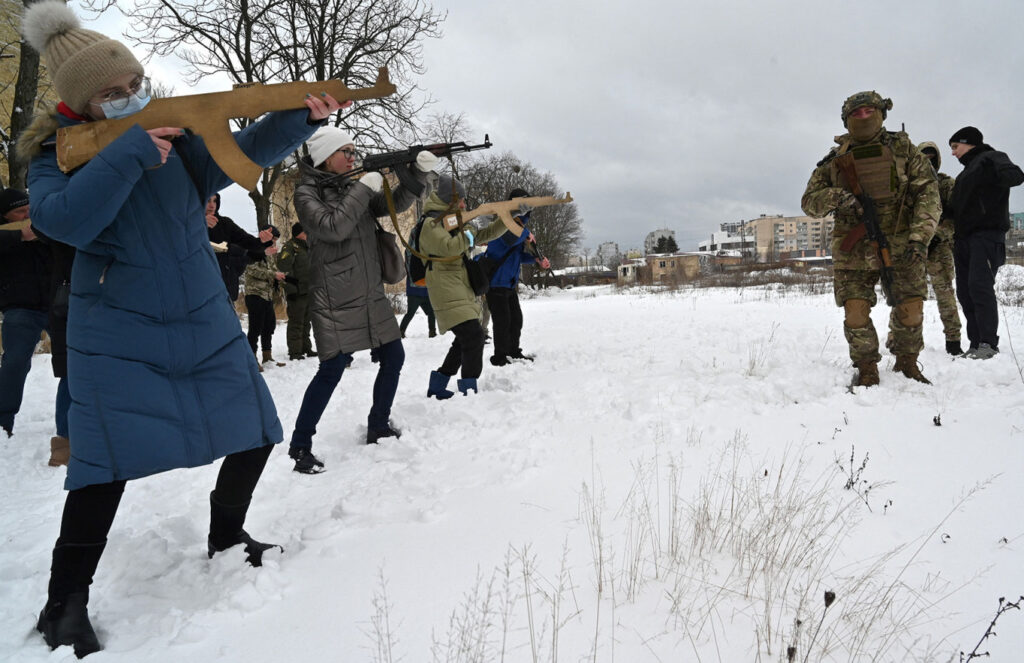
Putin’s announced intent to “de-militarize” and “de-Nazify” Ukraine is based on bald-faced lies. The war is simply an assault on Ukrainian independence, even existence, an attempt to bring independent Ukraine back under Russia domination.
Across Ukraine, the invasion’s first stage unfolded with aerial strikes, paratrooper seizures of airports, and armored and infantry columns advancing on key cities. Undoubtedly, significant security forces are traveling with these ground troops. The security forces are armed with lists of Ukrainian nationalists, democrats, governmental officials, and Russian, Belarusian, and other dissidents sheltering in Ukraine. Previously released Western intelligence points to this. This raises concerns about the possibility of summary executions. The reported presence, among the Russian columns, of noticeable numbers of prisoner transports indicates plans for the large-scale kidnapping of those who might play an instrumental role in organizing opposition to the Russians. It targets not only active resisters to the immediate invasion, but also and most importantly, those who might resist either longer-term direct occupation or a formally-independent puppet regime.
DEFEND UKRAINE!
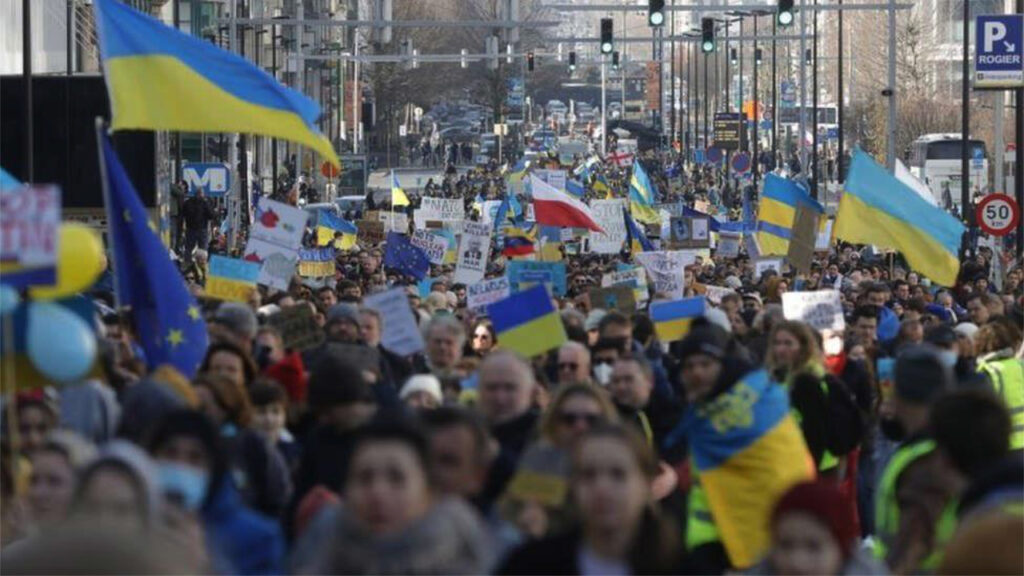
Defense of the democratic aspirations of the Ukrainian people begins with full support for their resistance in the face of Russia’s unprovoked assault. This aggression is not warranted by Russia’s security grievances. It is, first and foremost, driven by the Russian ruling class’s fear of, and desire to snuff out, a cultural, economic, and political alternative on its border. This alternative is an example that might contribute to undermining the Kremlin circles’ authoritarian grip on Russian society. Ukraine posed no military threat to the Russian state or its people. The Ukrainian government was involved in no activity challenging the Russian state except its defensive and diplomatic efforts to address the results of Putin’s 2014 aggression. Destroying Ukraine’s democracy, its independent economic potential, and its efforts to emerge from the effects of long years of Tsarist and Soviet coercive cultural assimilation are the real motives driving Putin’s visceral hatred of Ukrainian independence.
Defense of the Ukrainians’ right to self-determination requires the unequivocal defense of their right to take aid and arms from any sources they see fit. This is not a contest between evenly matched powers. It is another episode of resistance by a long-imperialized people with limited options. It is the case of a nation organized in a weaker state resisting the violence and domination of their militarily more powerful historical masters.
Full solidarity must be extended to this people’s war. This applies across the board, to those shouldering up in small groups, in larger social organizations, or in the armed forces of the Ukrainian government.
AGAINST RUSSIAN IMPERIALISM AND ITS APOLOGISTS
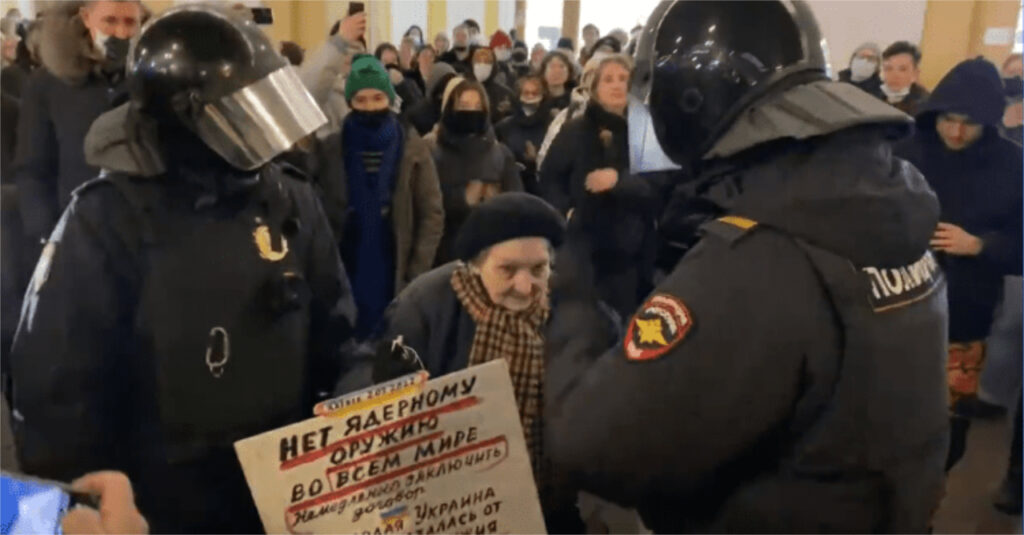
We all need to pay attention to movements opposing Russian imperialism in Eastern Europe, in the Caucasus region, and in Central Asia. Solidarity with the emerging Russian anti-war movement is crucial.
Present events require actions focused on Russian imperialism. This entails a refusal to take part in and efforts to expose false pro-Russian or muddle headed “peace“ initiatives. Agitation against the United States or other countries supplying arms and technical aid to Ukraine does Putin’s work. This is consistent with defense of Ukrainians’ right to arm and supply themselves as they see fit. Defense of this right does not imply support to these supplier governments. Their self-serving and treacherous natures must be exposed. We must be on guard against these governments using their control of these resources to assert their agendas and engaging in betrayals.
Exposure of and political combat with Putin’s overt supporters, various apologists, and obfuscators—left, right, or libertarian—is essential. This applies to abstentionists as well. This includes those who hide behind such slogans as “No War but the Class War.” The wider public holds understandable pro-peace/anti-interventionist sentiments along with fears of a direct US/Russia confrontation. A patient and respectful educational approach is called for here.
AGAINST IMPERIALIST ANCHORED MILITARY ALLIANCES—NO TO NATO AND CSTO
History should make us all wary of standing military alliances and diplomatic-military brinkmanship. After the Cold War, it would have been better had NATO disappeared along with the Warsaw Pact. However, given the nature of all existing hierarchies, competitive systems, ruling classes, statecraft, and nationalist memories and fears, this was not meant to be.
Absent an alternative, one can appreciate why Central and East European states climbed aboard NATO. They stand a bit more than 30 years free from Russian Soviet rule. In some cases, they were in a subordinate and colonial relationship to Moscow that extended back to the days of Tsarism. They also faced a Russia reemerging from the chaotic 1990s. This post-Soviet Russia took an increasingly authoritarian form and was resentful of its lost power and glory. That the Central and Eastern European nations placed themselves under NATO’s umbrella is not surprising. These peoples had, and still have, every right to do so. We should defend that right while arguing for a different course.
To my mind, an alternative path for all these peoples involves adopting an uncompromising revolutionary democratic, even anarchist, perspective. This will be an uphill struggle. It requires the emergence of fiercely autonomous popular movements whose position would be to forego NATO membership and all other entanglements with state elites. This path requires an energetic search for cooperative forms of self-defense attached to a revolutionary internationalist outreach to neighboring peoples.
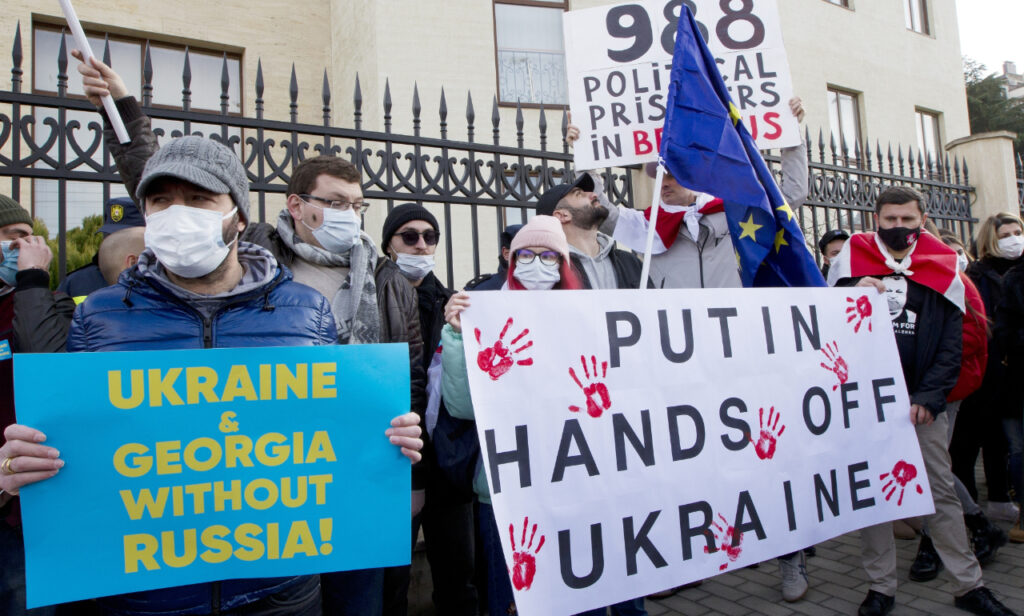
Today in Ukraine, this means not only supporting a tenacious internal resistance to Russian attack but also serious efforts to build solidarity with the peoples and oppositional movements within the Russian Federation and the Collective Security Treaty Organization states. Belarus strongman Lukashenko allowed his country to be a staging area for the assault on Ukraine. Prior strike waves and rebellions, sustained in Belarus and more quickly repressed in Kazakhstan by Russia under the guise of CSTO, show the need for coordinated insurgent struggles with no ties to or reliance on NATO.
Support for Ukraine today is inseparable from the worldwide struggle against interlocking high-state kleptocrats, oligarch-capitalists, bought parties and parliamentarians, general staffs, security organs, and Mafia-type networks. A combative united front of independent industrial workers organizations, small businesses and tradespeople, alternative media, and social sector formations must be built to wage this fight.
BACKGROUND TO THE CONFLICT
Most of the US population knows little-to-nothing about either Ukraine or the wider region. Lies and a range of other mischaracterizations of Ukrainian events, present and past, have gained wide traction. The dissemination of these falsehoods can be laid not only at the feet of Putin’s propaganda apparatus. The RT cable network is only one example. Several other actors from across the political spectrum stand guilty as well.
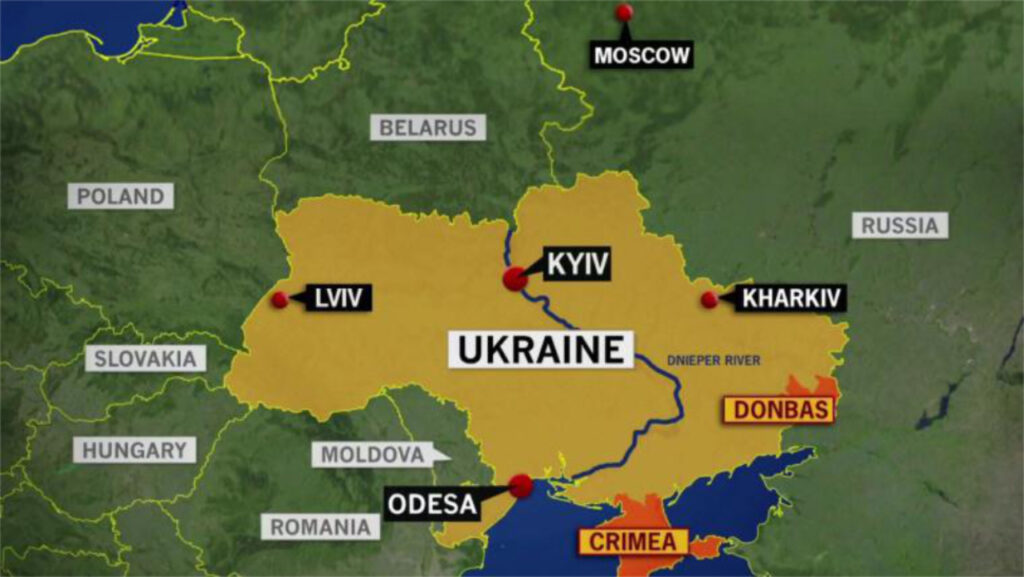
It remains unknown whether Putin was fully set on invasion at the outset of his months-long military mobilizations. The invasion’s genesis began as a giant stress test of the cohesion of the European Union and NATO and of Ukraine’s internal political cohesion as well. A long string of events gave close observers reason to question the strength and depth of both the EU’s and NATO’s overall commitment to Ukraine’s increasing Western orientation. For quite some time, member states have exhibited wide differences in enthusiasm for Ukrainian accession to these respective politico-economic and military bodies. Heading into the Maidan uprising, Poland, a member of both bodies, and Sweden, only in the EU, stood as Ukraine’s most prominent partisans.
These differences increased in the wake of the 2008-9 recession. During the following period of heightened national concerns, internal populist challenges, political polarization, and the COVID pandemic, these differences became even more pronounced. The Trump interlude and particularly Trump’s lovefest for Putin, his questioning US/NATO relations, and his withdrawal of the US from the Paris Climate Accords, led to a generalized weakening of America’s leadership role in Europe. US society’s fatigue with two decades of war, a refocusing on China, and the recent summer’s poorly executed Afghan pullout also tempted the Kremlin to take rash action.
RUSSIA vs. NATO
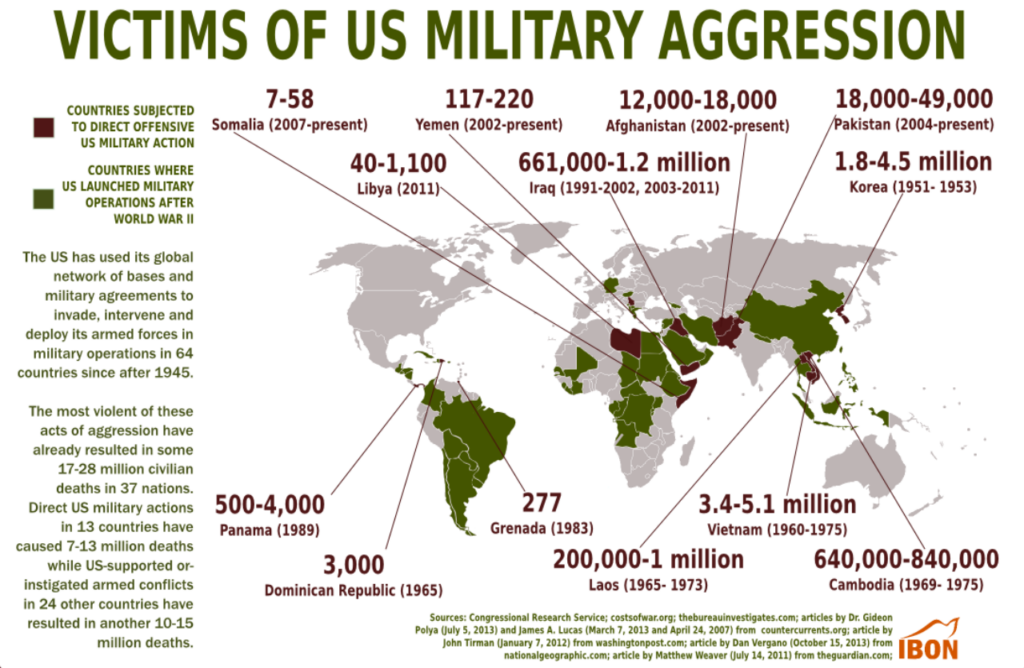
The United States stands far from guiltless in brutal attacks on weaker states and peoples. The US and the larger Western states time and again employ NATO in military adventures and occupations. The disastrous interventions in Iraq, Afghanistan, and Libya are prime but not sole examples of this. The Western alliance powers, dominant in international finance, also wield their economic power in a highly coercive fashion worldwide. These facts cannot be lost sight of. However, the hypocrisy of the main Western imperialist states must not be used to detract from a clear understanding of the aggressive nature of the imperialists in the Kremlin. Over long years, Russian regimes saddled the peoples of East and Central Europe, the Caucasus, and Central Asia with highly intrusive dictatorial rule. Time and again, they have crushed popular revolts. In Germany 1953, Hungary 1956, and Czechoslovakia 1968, they directly intervened. In the Polish upheavals of 1956, ’68, ’70, ’76 and ’80, their puppets did the job.
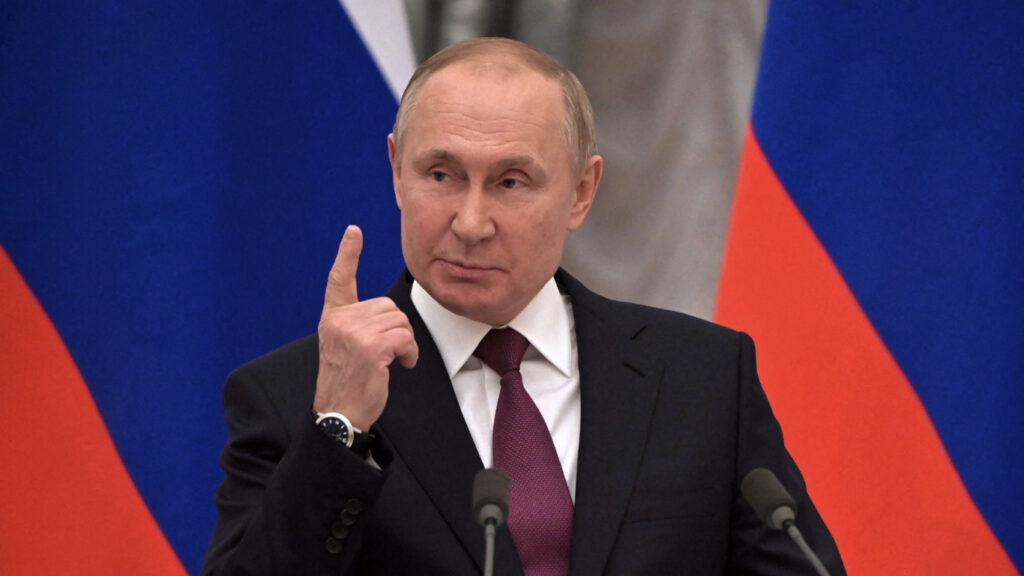
Three decades after Russia lost its grip, Putin is now trying to restore Russian domination of the region. His two brutal wars in Chechnya, the carve out of “Transnistria” from Moldova, the war on Georgia, and the bloody rescue of Assad from popular revolution in Syria preceded his attack on Ukraine. The intended dismemberment of Ukraine at Putin’s hands will only lead to further aggression against those nations bordering Russia.
Clearly, Russia has security concerns with NATO’s eastward expansion. However, until the events of recent weeks, this growth was not accompanied by the placement of significant numbers of non-local NATO troops in new member countries. Nor were decidedly offensive weapons placed there. While certainly not a benign or benevolent force, NATO had not assumed a threatening posture towards Russia in some time. In contrast, since 2014, Russian military, clandestine, and proxy forces have been the bad actors in the region.
The year 2014 saw the Russian seizure of Crimea and the eastern portions of Ukraine’s Luhansk and Donetsk provinces, and the downing a civilian airliner by Russian proxies in those regions. In the ensuing eight years of off-and-on-again conflict, 14,000 Ukrainian citizens and soldiers have lost their lives and 1.6 million people turned into refugees. Given that they enjoy only limited popular support, Russia’s “Peoples Republics” proxies would have melted away long ago without their Russian shield.
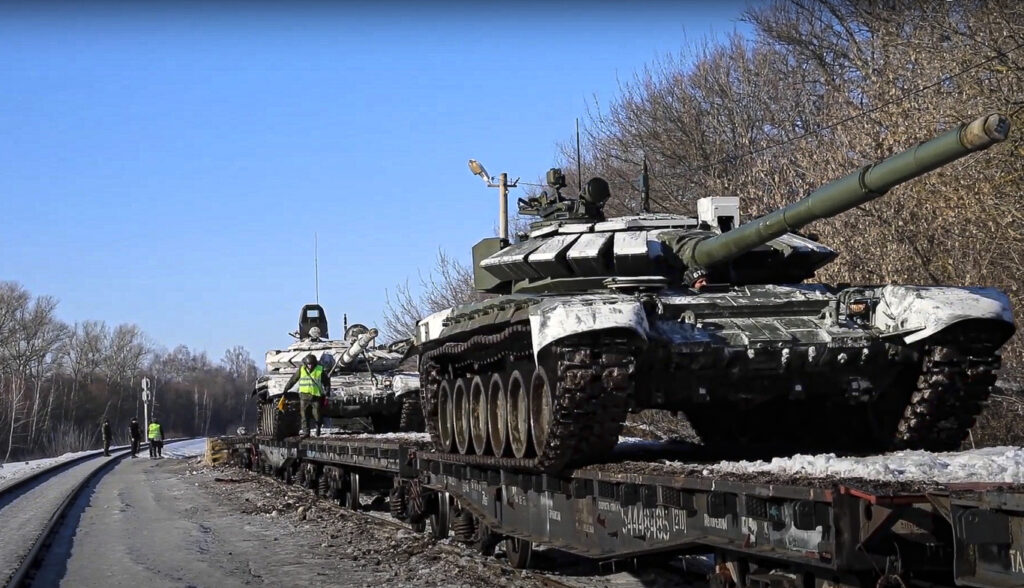
Elsewhere, overt violations of airspace and aggressive antics by Russian air and naval forces in and over the Baltic region occur with regularity. This has led non-members, Finland and Sweden, to consider joining NATO. The GRU (Russian military intelligence) is suspected in major explosive attacks at a Czech NATO arms depot and a Bulgarian armaments plant. Russian sponsored cyber-attacks occur regularly. On January 13-14 alone, Ukraine saw assaults on 71 governmental web sites. Recent years saw two cyber takedowns of Kyiv’s electrical grid. More incidents of this nature throughout the region could be listed.
For years, the Russian state has engaged in myriad forms of economic and political subversion directed at its neighbors and one-time imperial possessions. Since it lacks “soft power “attraction, it turns to info-war managed by “political technologists” and an elevated hybrid-warfare posture for its special operations apparatuses.
The US/NATO response to Russia’s long build-up to the present war was slow in coming. The US has now reasserted its leadership in the region. It has done this by embracing the concerns of the eastern tier of NATO members. These nations felt that they had a second-class status in the organization. They saw Germany, France, and other countries as too accommodating towards Russia and at best lukewarm to their concerns and those of Ukraine.
UKRAINIAN NATIONALISM
Ukrainian nationalism has a tragic history; the 2014 Maidan uprising and ensuing events are often misunderstood and maligned. Putin’s regime is the prime author and promoter of these slanders. Ukrainian national development is the target of and main motivating factor behind Putin’s war. The issue of NATO, though not unconnected, was not the trigger. The tenor of Putin’s rants against Ukrainian independence demonstrates this.
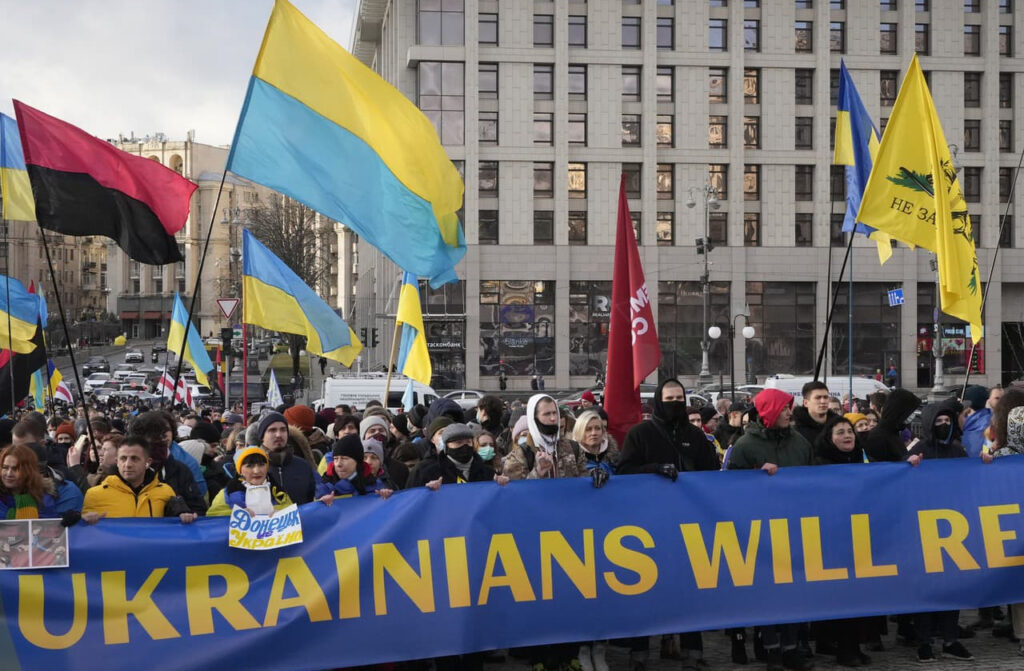
The years since the 2004 Orange Revolution and the more profound 2014 Revolution of Dignity have seen the increased development of a Ukrainian civic and cultural nationalism. This inclusive form of nationalism is ever more widespread than either the still-present and impactful ethno-nationalist currents or the receding attachments to a pro-Russian orientation. More and more of the population, especially young people, feel comfortable with European liberal models. The dominant politics in Ukraine tend to be right-liberal in cast. They are sharply opposed to Putin’s state for its heavily authoritarian constraints and reactionary-patriarchal influences. The Kremlin views the steady march of the Ukrainians away from its re-expansionist/cultural chauvinist “Russian World” project with a mixture of disbelief and alarm.
Putin launched this criminal war in desperation. Ukraine fights on and deserves the admiration and support of all.
Defend Ukraine! Revolutionary Opposition to Russian and U.S. Imperialism!
By Wayne Price
Ukrainian Self-Determination and Anti-Imperialism
(Editor’s note: The following statement appears in The Utopian as a personal statement by Wayne Price.)
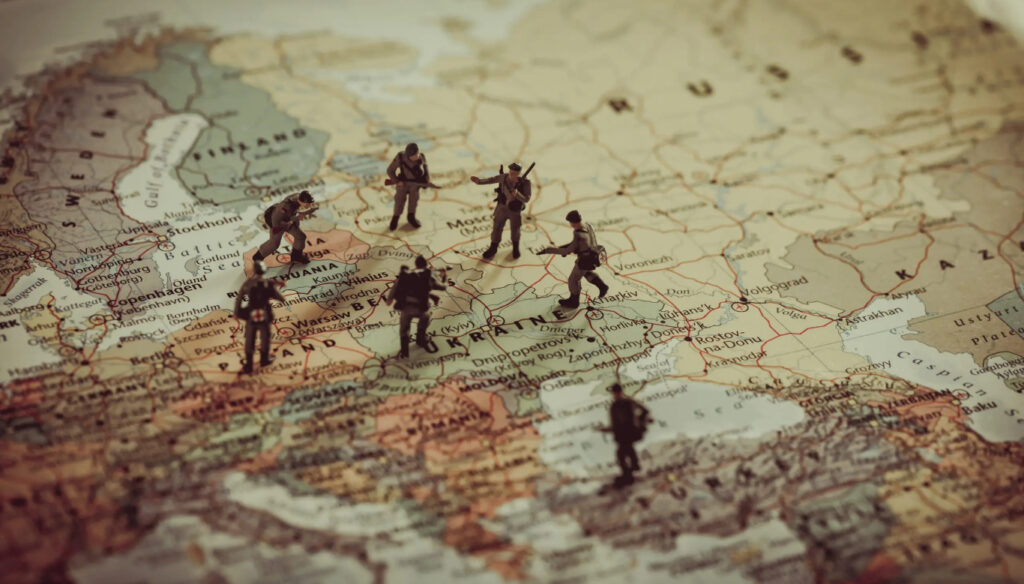
Anti-war activists, anti-imperialists, and radicals need to be in solidarity with the Ukrainian people, against Russian aggression, while opposing both U.S. and Russian imperialism.
The Ukrainian crisis may be seen as two intersecting and overlapping conflicts. One is the underlying competition between the U.S. imperial state and the Russian imperial state (and the allies of each). The other is between the Russian imperial state and the weaker, oppressed, nation of Ukraine.
The traditions of revolutionary anarchism and left-Marxism have opposed all imperialist states in their inter-imperialist conflict, rejecting all sides. Also, they have generally opposed the oppression and exploitation of weaker countries by stronger, imperial, states. The question of “who is the aggressor?” (or “who fired the first shot?”) is not central, compared to the dynamics of oppression and domination.
U.S. and Russian Imperialisms
Both the U.S.A. and Russia are capitalist states which throw their weight around internationally. Together they have 90% of the world’s nuclear bombs—which risks exterminating humanity and other species. They supply a large proportion of the world’s oil and gas, setting the stage for global climate catastrophe. The U.S. is the biggest, wealthiest, state with the biggest armed forces and most foreign bases in the world, even if it is in decline. Russia is much weaker and less economically significant but still a large militarized state. The US state wants to counter its own international decay, especially in comparison to its allies in Europe and to its other main competitor, China. The Russian state, under its authoritarian ruler Vladimir Putin, wants to expand politically, economically, and militarily, to make up for the collapse of the empire of the Soviet Union.
The U.S. laid the background for the current crisis. In 1991, the U.S. and the Soviet Union agreed to end the Cold War. Russia agreed to let Germany be reunited. The U.S. government promised to not expand NATO’s military alliance further to the east, “not one inch.” However, the U.S. did not keep its promise. It incorporated 14 more countries into NATO, coming up to Russia’s borders. It provided military supplies and bases for these countries, which included Poland. This went along with the eastward expansion of the European Union. (A few far-sighted politicians and military people warned of the dangers of U.S. policy but they were ignored.) The Russians were not directly or immediately threatened, but—by the logic of national states—this inevitably put pressure on them to push back. The expansion of NATO may have been a reason for Russia’s invasion of Ukraine or it may only have served as an excuse—but either way it destabilized the region.
There are many on the left who see the U.S. as the only danger and therefore support any anti-U.S. force, no matter how oppressive or undemocratic (this is “campism”). But U.S. imperialism is not the only imperialism, just as imperialism is not the only capitalist evil (as is demonstrated by the repressive dictatorships among the poorer nations).
In this case, Ukraine has been oppressed by Russia for centuries. It was ruled by the Czarist empire and then by the Stalinist-Communist dictatorship. Now the present authoritarian Russian state wants to dominate it again. Unlike many U.S. leftists, every Ukrainian is aware of this history.
While opposing the imperialism of the various great powers, revolutionary socialists defend the self-determination of oppressed nations. That does not require endorsing the governments or leaderships of these nations. It means being in solidarity with the people (who are mostly workers, peasants, local merchants, and the poor). It means supporting these nations’ independence, self-organization, choice of social, economic, and political system, etc. Anarchists may not agree with the political and economic opinions of the majority of the people (who usually want their own national state). But revolutionary libertarian socialists are in solidarity with the people and their right to make their own choices— including their right to learn from their own mistakes.
The United States government makes a big show of supporting Ukraine’s national self-determination. Before the Russian invasion, the U.S. insisted that Ukraine had the right to join NATO. The Russians had asked that the U.S. promise that Ukraine would never join the Western military alliance. In fact, it was well-known that Ukraine was not going to be allowed into NATO in any foreseeable future. But the U.S. state insisted piously that it could not provide Russia with a guarantee on this, because every sovereign state had the right to choose whatever alliance it wanted to join. While abstractly true, this assertion by the U.S. deserved a horselaugh. Consider the reaction of the U.S. when Cuba allied with the Soviet Union: boycotts and quarantines, attempts to assassinate President Castro, organizing the Bay of Pigs invasion by Cuban exiles, etc. Then when Castro and Russia’s Khrushchev put nuclear-armed missiles in Cuba, the U.S. blockaded the island militarily and risked a nuclear world war. (I am not supporting the reckless decision of the Cuban and Russian states to install these nuclear missiles.)
Imagine today the U.S. reaction if Mexico were to announce a military accord with China, with Chinese missile bases on the U.S. border!
Right now, the U.S. is militarily supporting monarchist Saudi Arabia, in its war in Yemen, with horrible consequences for the Yemeni people. And the U.S. is continuing its large-scale support for Israel’s oppression of the Palestinian people, denying them any sort of national self-determination. The hypocrisy is so obvious that even an intelligent (“Never Trump”) conservative, Bret Stephens, could write:
“Who are we, with our long history of invasions and interventions, to lecture Vladimir Putin about respecting national sovereignty and international law? Who are we, with our domestic record of slavery and discrimination, our foreign record of supporting friendly dictators, … after 198 years of the Monroe Doctrine, to try to stop Russia from delineating its own sphere of influence?” (Stephens 2022; A22)
Being a bourgeois pundit, he concludes that the U.S. should still intervene in the Ukraine vs. Russia conflict, asking, “Who but us?” (The working people of Ukraine and Russia?)
Russian Aggression
The Russian government is more ambiguous in its justification of its war on Ukraine. Vladimir Putin denies that Ukraine is a country or that Ukrainians are a people. He has repeatedly asserted that they are merely a part of Russia and always have been. In a conversation with George W. Bush, he said, “Ukraine is not even a State.” Putin blamed Lenin and the Bolsheviks for regarding the Ukrainians as a people who needed their own republic when the USSR was established. Since, he claims, Ukraine is not a nation, it can have no national self-determination.
Instead, Putin’s regime has worked up a bunch of other reasons to justify its war on the Ukrainians. He claims that their state is Nazi, for example, and promises to “de-nazify” Ukraine. It is true that neo-Nazi and ultra nationalist far-right trends have grown in Ukraine, feeding off the reaction against Russian imperialism. Ukrainian anarchists and others have opposed them. But such groupings do not, by any means, control the government. They have almost no representatives in parliament and the president, Volodymyr Zelensky, is a Jew. In any case, the cruel dictatorship of Saddam Hussein did not justify the U.S. invasion of Iraq nor the misogyny of the Taliban the U.S. war on the Afghan people.
Putin and his minions have a nerve denouncing supposedly fascist governments. Putin has allied himself with neo-Nazi and far-right forces in Russia and internationally. He has built up an undemocratic ultra nationalist bourgeois regime, tied to the Russian Orthodox Church. He has whipped up rage against LGBT people as “Western” threats to Russia. In the U.S., Putin and the far-right Donald Trump have long had a lovefest, recently demonstrated in Trump’s praise of Putin’s actions in Ukraine. Who is the fascist? (Further, speaking of mass-murdering totalitarians, any process of Russian “de-Stalinization,” rooting out those who made the Soviet Union so oppressive, would surely include punishment for officers of the KGB police, such as Vladimir Putin!)
Putin also charges that the Ukrainian government has been committing “genocide” against the Russian-speaking minority in eastern Ukraine (the Donbas), which is a lie. For eight years Russian forces have supported two breakaway states in eastern Ukraine, in a secessionist war with the majority of the country. Most of the Russian-speakers there had voted for an independent whole Ukraine in 1991. What they want now, under the conditions of authoritarian pro-Russian rule and civil war is anyone’s guess. The Ukrainian regime has not handled this well, removing Russian from being an official language and not providing autonomy for the eastern Russian-speakers. Whatever the failures of Ukraine in its treatment of its Russian-speakers, they hardly justify Russia invading and taking over the country.
The same point can be made in relation to Putin’s other complaints. The Ukrainian government asked to join NATO (but was rejected). It might someday set up nuclear missiles (but in 1994 it got rid of the nuclear missiles it inherited from the Soviet Union, sending many to Russia). The government is corrupt and undemocratic (this from Putin!). And so on, none of which remotely justifies a Russian invasion.
Some on the libertarian left argue that anarchists do not support national liberation, and therefore should not take sides in the Russian war on the Ukrainians. Some ignorant anarchists think that “national self determination” was invented by Lenin. Actually, it has long been part of the program of bourgeois-democracy and classical liberalism, along with freedom of speech and association, freedom of religion, land to the farmers who use it, the right to bear arms, the election of officials, equality of races, genders, and nationalities, trial by jury, and so on. (The bourgeoisie has always failed to consistently carry out its democratic program.)
The revolutionary anarchist Michael Bakunin wrote, “Nationality, like individuality, is a natural fact. It denotes the inalienable right of individuals, groups, associations, and regions to their own way of life. And this way of life is the product of a long historical development [a confluence of human beings with a common history, language, and a common cultural background]. And this is why I will always champion the cause of oppressed nationalities struggling to liberate themselves….” (Dolgoff, 1980, p. 401) By “nationality…is a natural fact,” he meant, not that nationality is a biological fact, but that it is created mostly by unplanned, unpurposive, social history.
As Peter Kropotkin wrote, “True internationalism will never be obtained except by the independence of each nationality, little or large, compact or disunited–just as [the essence of] anarchy is in the independence of each individual. If we say, no government of man over man, how can [we] permit the government of conquered nationalities by the conquering nationalities?” (Quoted in Miller, 1976, p. 231)
The basic principles of the situation should be clear: support for the Ukrainians against the Russian invaders. Oppose both Russian and U.S. imperialism. It is a tactical question to decide how to implement these principles. In Russia there has developed an antiwar movement, whose main demand is peace and the withdrawal of Russian troops from Ukraine. In Ukraine, they certainly want Russian troops to withdraw, but a call for “peace” is probably mistaken. Rather they have to fight against the invaders. In the U.S. radicals should stay clear from endorsing the government’s policies, and should call for the withdrawal and abolition of NATO.
However, it would be a mistake to oppose the U.S. sending arms to the Ukrainian army or people. The Ukrainian people are literally under the gun. It is up to them how to fight and from whom to get arms. They should not be criticized for taking weapons from the U.S. or elsewhere— although they should be warned not to trust the U.S. or NATO.
The same point applies to Ukrainian anarchists. Should they form guerrilla groups to resist the Russians? Join various volunteer organizations to aid the fight? Join the official army? These are issues best left to those on the ground, facing the enemy (or enemies). But wherever possible, they should try to promote political independence of the majority of people, the working class and oppressed, from the national state, the capitalist rulers, and U.S. imperialism—and promote a reliance on their own forces.
The U.S. Left
The U.S. Left has fractured over the Ukrainian-Russian war. By and large, most liberals have accepted the administration’s views uncritically. They ignore what the U.S. and NATO have done to prepare the conflict and their hypocrisy in opposing Russian aggression.
Many radicals and far-leftists have been on the side of Russia, finding excuses for the invasion. They have learned so well to oppose U.S. imperialism that they can only see the world through anti-U.S. lenses, ignoring the complexity of reality. They care nothing at all about the self determination of Ukraine, so long as there is peace between Russia and the U.S. We can expect a similar non-reaction if China were to attack Taiwan—looking at every aspect of the issue except what the people of Taiwan want.
But there is a part of the radical left which opposes both U.S. and Russian imperialisms. Sometimes this minority has little to say about defending Ukrainians. But often it also calls for the self-determination of Ukraine, including its right to self-defense. It looks for splits in ruling classes and those behind them.
Popularly, in Russia there have been demonstrations against the war in over 50 cities so far—bravely done, since so many demonstrators were arrested. Also, the Confederation of Labor of Russia [KTR], with more than 20 unions and about 2 million members, denounced the war and called for a negotiated peace. These reflect discontent among Russia’s working classes and oppressed people, a discontent which may lead anywhere.
The people of Ukraine have risen to the challenge of the invasion, and shown a remarkable degree of courage and determination. Both the official army and the volunteer forces have heroically fought back against better armed and larger military forces How this will play out, cannot be presently known, but the Russians will pay a far greater price than they expected to.
The world is in a dangerous place. The deadly pandemic is far from under control—and there will be more plagues. The international economy, while back from the brink of collapse, remains unstable and vulnerable, with a vast expansion of economic inequality. The global climate continues to come unstuck, devolving toward a climate catastrophe, along with cataclysms in every aspect of the ecology. Despite the end of the Cold War, the great powers have never been able to disarm their nuclear bombs. Political democracy (however limited under capitalist states) has been under attack wherever it exists.
It is in this context that a major imperial state has invaded another, relatively developed, country. This has put the invader, Russia, in confrontation with the U.S.—a confrontation of two nuclear-armed states.
The international capitalist class, with its states and world corporate market, is not capable of maintaining society. It cannot be depended on to keep the peace, provide ecologically balanced prosperity for everyone, and develop a self-governing radically democratic, cooperative society the world around. Working people and the oppressed of all lands must work together and replace these rulers with freedom, equality, and full democracy. This can begin by being in solidarity with the Ukrainians, against both Russian aggression and U.S. imperialism.
References
Dolgoff, Sam (ed. and trans.). (1980). Bakunin on Anarchism. Montreal: Black Rose Books.
Miller, Martin (1976). Kropotkin. Chicago and London: University of Chicago Press
Stephens, Bret (2/23/2022). “Ukraine and America’s Self-Belief” NY Times. A22.
Written for Anarkismo.net

